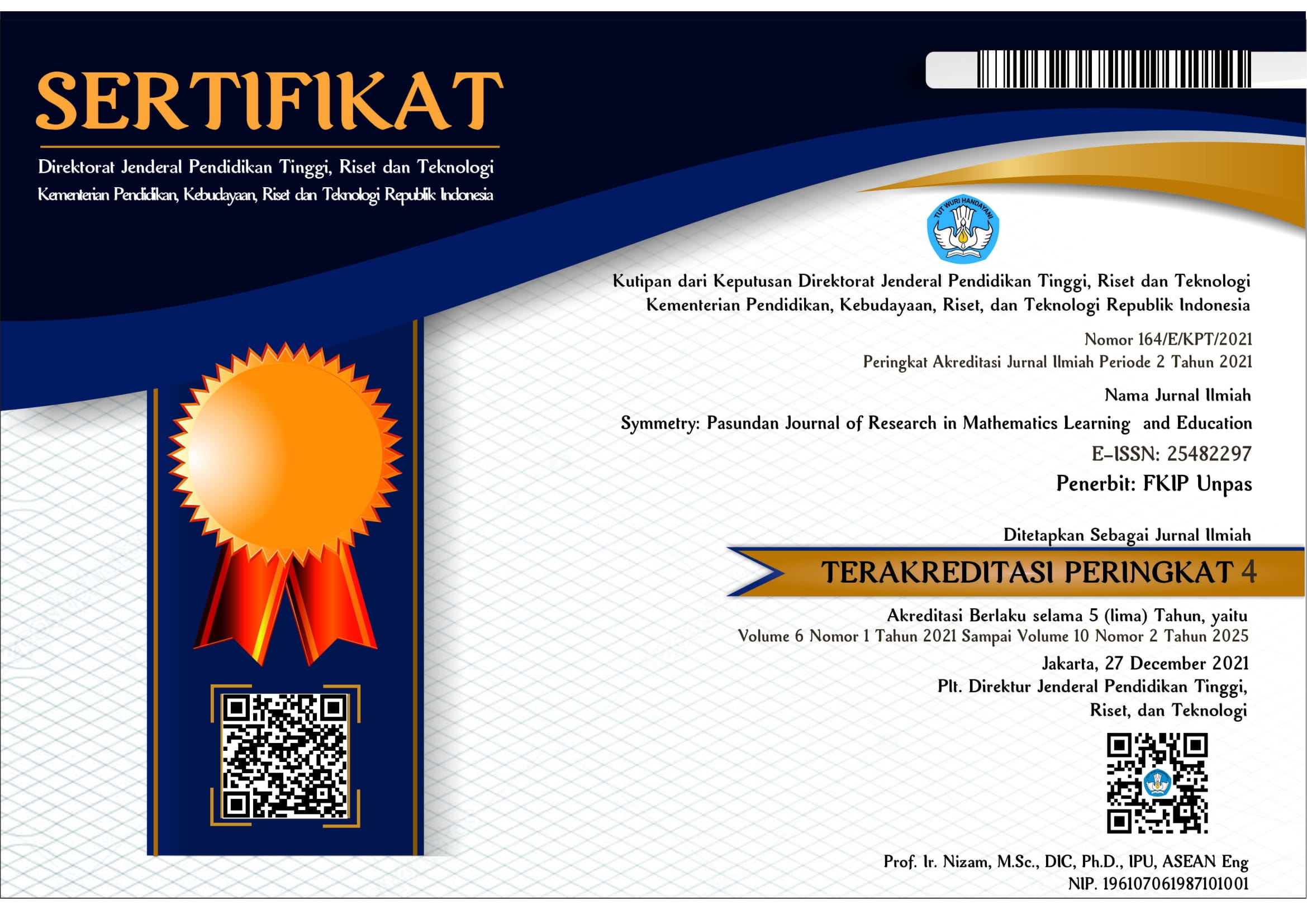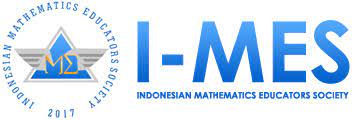KEMAMPUAN PEMECAHAN MASALAH DITINJAU DARI METAKOGNISI PADA MODEL PROBLEM BASED LEARNING BERBANTUAN GOOGLE CLASSROOM
DOI:
https://doi.org/10.23969/symmetry.v9i2.16897Abstract
Based on the results of interviews with teachers at SMP N 16 Semarang, it is known that in the learning process, students are not yet optimal in their mathematical problem solving abilities. This research aims to: (1) find out whether the Problem Based Learning learning model assisted by Google Classroom is effective on students' mathematical problem solving abilities, (2) find out the proportion of students' mathematical problem solving ability who obtain the Problem Based Learning model assisted by Google Classroom is higher than the proportion the mathematical problem solving ability of students who receive conventional learning, (3) knowing that the mathematical problem solving ability of students who receive the Problem Based Learning model assisted by Google Classroom is higher than conventional learning, and (4) whether there is an increase in students' mathematical problem solving ability after implementing Problem Based Learning model assisted by Google Classroom. The method used is mixed method sequential explanatory design. The research population was class VIII students at SMP Negeri 16 Semarang for the 2023/2024 academic year. The research subjects consisted of 6 students, namely 2 high, 2 medium and 2 low metacognition categories.
Downloads
References
Al-Fitriani, N. A., Darta., & Kandaga, T. (2023). Penerapan Model Problem-Based Learningberbantuan GeoGebra untuk Meningkatkan Kemampuan Literasi Matematis. Symmetry: Pasundan Journal of Research in Mathemetics Learning and Education.8(1), hlm. 138-145
Alkadrie, R. P., Mirza, A., & Hamdani. (2015). "Faktor-Faktor yang Mempengaruhi Level Metakognisi dalam Pemecahan Masalah Pertidaksamaan Kuadrat di SMA". Jurnal Pendidikan Dan Pembelajaran Untan. 4(12): 1-13.
Amin, Ihdi & Sukestiyarno. (2015). Analysis Metacognitive Skills on Mathematics Learning in High School. International Journal of Education and Research. 3(3): 213-222.
Anggo, M. (2011). "Pelibatan Metakognisi dalam Pemecahan Masalah Matematika". Edumatica, 1(1): 25-32.
Ariani, Suci., Hartono, Yusuf., Hiltrimartin, Cecil.2017. "Kemampuan Pemecahan Masalah Matematika Siswa Pada Pembelajaran Matematika Menggunakan Strategi Abduktif-Deduktif Di Sma Negeri 1 Indralaya Utara". Jurnal Elemen, 1(2):25-34.
Botty, Haji MR.H., et al.2016. "The Implementation of Problem-Based Learning (PBL) in Year 9 Mathematics Classroom: A Study in Brunei Darussalam”. International Research in Education, 4(2).
Chairani, Z. Metakognisi Siswa dalam Pemecahan Masalah Matematika. Yogyakarta: Deepublish.
Frazwanti, Y.,Mariani, S.,Agoestanto, A.,&Sugiman. (2024). Meta Analisis: Model Pembelajaran Problem Based Learningdalam Meningkatkan Kemampuan Penalaran Matematis Siswa SMP.Symmetry: Pasundan Journal of Research in Mathemetics Learning and Education.9(1), hlm. 37-47
Hidayat, Y.,N., Wardono &Rusilowati, A.. (2017). Analisis Kemampuan Literasi Matematika Ditinjau Dari Metakognisi Siswa dalam Pembelajaran Synectic Berbantuan Schoology, ISSN 2613-9189.
Huda, Miftahul. (2013). Model-model Pengajaran dan Pembelajaran. Yogyakarta: Pustaka pelajar.
Laurens, T. (2010). "Penjenjangan Metakognisi Siswa yang Valid dan Reliabilitas". Jurnal Pendidikan dan Pembelajaran. 17(2): 201-210.
Madzkiyah, A F., Subanji, & Arifin, S. (2024). Analisis Kemampuan Pemecahan Masalah Matematis pada Materi Operasi Bilangan Cacah Kelas IVSDInpres 29 Kabupaten Sorong. Symmetry: Pasundan Journal of Research in Mathemetics Learning and Education.9(1), hlm. 110-118
Manning, Brenda H. (1991). Cognitive Self-Instruction for Classroom Processes. State University Of New York Press: New York.
Netriwati. 2016. "Analisis Kemampuan Mahasiswa dalam Pemecahkan Masalah Matematis menurut Teori Polya". Al-Jabar: Jurnal Pendidikan Matematika 7(2): 181-190.
NCTM (National Council Of Teachers Of Mathematic). 2000. Principles And Standards For School Mathematics. Amerika Serikat: NCTM.
Sudjana. 2005. Metoda Statistika (Edisi ke 6). Bandung: Tarsito.
Downloads
Published
Issue
Section
License
Copyright (c) 2024 Symmetry: Pasundan Journal of Research in Mathematics Learning and Education

This work is licensed under a Creative Commons Attribution 4.0 International License.
Hak Cipta sepenuhnya ditangan jurnal.



















